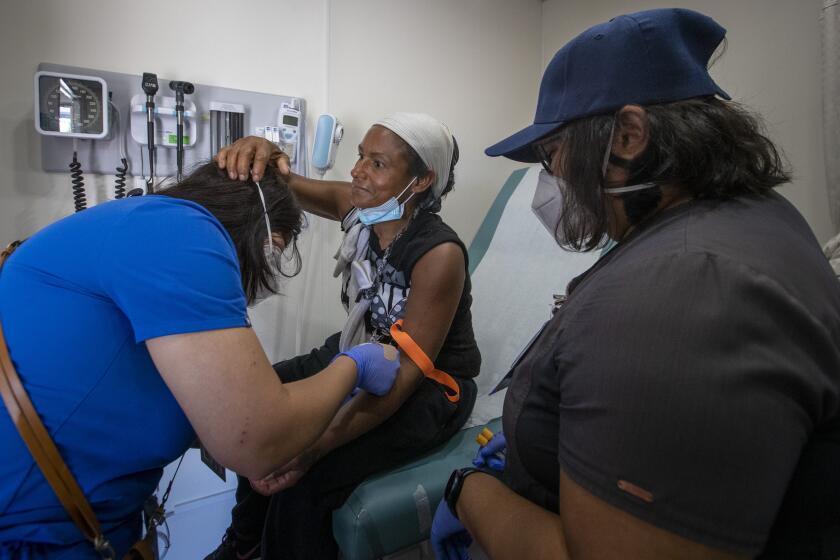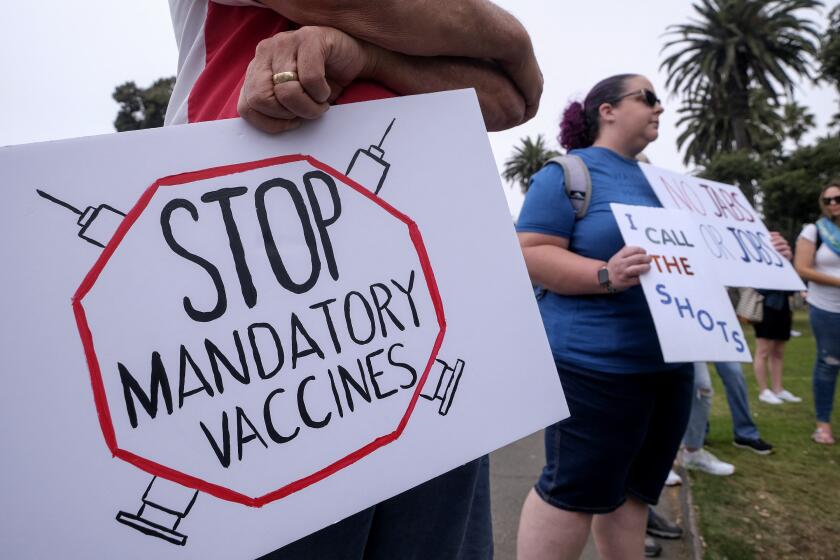Column: Should I call my doctor ‘doctor’ or is that passé?

- Share via
I’m a 64-year-old man — a longtime adult, a father of three grown children, comfortable in most settings. Yet when I talk to my doctor, who is friendly, warm and reasonably chatty, I squirm uncomfortably and worry like a kid about what I should call him.
I’ve known him for 20 years, but when he walks into the room I don’t know whether to address him as “Dr. Stone” or call him by his first name. We know people in common. We’re about the same age. We often discuss things that are not health-related.
But I stammer and stutter over calling him by his name.
Opinion Columnist
Nicholas Goldberg
Nicholas Goldberg served 11 years as editor of the editorial page and is a former editor of the Op-Ed page and Sunday Opinion section.
Of course, he calls me by my first name, which in most relationships would constitute permission to call him by his. But the doctor-patient relationship is different. The way it works, at least where I grew up, is like this: He’s the doctor, the authority, the expert, and I’m the supplicant, the subordinate, the layman.
He’s like a judge in his courtroom or a senator at his podium. You don’t use his first name lightly.
I know, I know — in our falling-apart world, this is just a small bit of transitory social awkwardness. But it gets to something important about the relationship between doctors and patients, not to mention the state of 21st century etiquette.
This subject had already been on my mind when I read recently about a new study in the journal JAMA Network Open. Conducted by researchers at the Mayo Clinic, it found that only about 8.4% of patients — 1,307 out of 15,637 surveyed — called their doctors by first names.
Not so many, I admit. It didn’t exactly encourage me to change my approach. What’s more, when I read further I learned that a different study, from 2000, concluded that 61% of doctors were “very or somewhat” annoyed when addressed by their first names.
Why are they annoyed? The study didn’t say. But the less-generous interpretation is pretty simple: Doctors actually believe they’re better than the rest of us and think they should be treated as such.
The Department of Health Services launched a system of rolling clinics, expanding the care that clinicians can immediately offer to unhoused people.
Perhaps by maintaining a formal distance and encouraging an unequal relationship they also feel less compunction about keeping us waiting around for appointments and then pushing us roughly through the medical-industrial assembly line.
Those were my nasty gut reactions.
But then I thought about Dr. Stone, an easygoing, attentive, knowledgeable physician who has never for a moment treated me like a body on an assembly line. So I decided that after 20 years, the time had come to ask him myself — in a note addressed to “D.S.” — what he thinks about this thorny first-name issue between doctors and patients.
It turns out he thinks there’s more to it than my ungenerous interpretation.
He believes that a measure of formality can be helpful in the doctor-patient relationship.
For instance, he wears a tie and long-sleeve shirt every day, he says, because he believes it’s reassuring to patients and sends a message that he is a professional who takes the job seriously.
Americans who still aren’t fully vaccinated against COVID-19 probably have some immunity from a past infection. They may not be so dangerous anymore.
His theory is backed up by a study in the UK that shows patients are more comfortable with doctors who wear suits, long sleeves, long dresses. They are less comfortable (or would be) with doctors who have facial piercings, dyed hair or wear shorts, miniskirts or sandals. But you probably could have guessed that.
Dr. Stone also believes that the honorific “doctor” helps convey a measure of authority, which can encourage what’s known in the medical industry as “compliance.” If patients respect their doctor, they are more likely to recognize his or her expertise and follow his or her recommendations.
Think of the respect that dashing Dr. Kildare, the 1960s TV show doctor, received from his patients. Or soothing Marcus Welby, M.D. No patient would have dreamed of calling them by their first names or disregarding their advice.
That said, Dr. Stone is also realistic. On first meeting new patients, he introduces himself as Dr. Stone and, at least at first, calls them by the titles Mr. and Ms. (unless they’re so young it seems inappropriate). But over time, he says, as many as half of his patients call him by his first name — and he doesn’t really mind. “If they ask, I tell them to call me what they’re comfortable with,” he says.
Interestingly — but utterly unsurprisingly, on reflection — the study from the Mayo Clinic revealed a pernicious double standard at work: Female doctors are twice as likely to be called by their first names as male doctors. That’s sexism, plain and simple. According to the 2000 survey, female doctors are quite irritated by this and other “boundary transgressions.”
Public health officials can fix some of the communication foibles of the COVID era that helped spread disease.
What kind of other transgressions? Well, female doctors are also more likely than male doctors to be asked personal questions by patients, offered “inappropriate affection” and to be talked to in sexually explicit language.
The studies I saw didn’t address how often nonwhite doctors are “untitled” (i.e., not called “doctor”) by their patients.
They did show that specialists are more likely to be called “doctor” than primary care doctors.
I think it’s safe to say that in recent decades formality in general has become less of a thing. Titles and honorifics, unless you’re a member of the royal family, have become somewhat less de rigueur, in my experience. A few decades ago we probably all called our doctors “doctor” or at least “doc.” It was a given that the relationship was unequal and that some formal boundaries should apply.
My bottom line on the subject is that you want to keep your doctors on your side, whatever that takes — because someday they may be involved in the decision whether to pull your plug.
But from here on in, I’m dropping the “doctor” with Dr. Stone.
More to Read
A cure for the common opinion
Get thought-provoking perspectives with our weekly newsletter.
You may occasionally receive promotional content from the Los Angeles Times.















